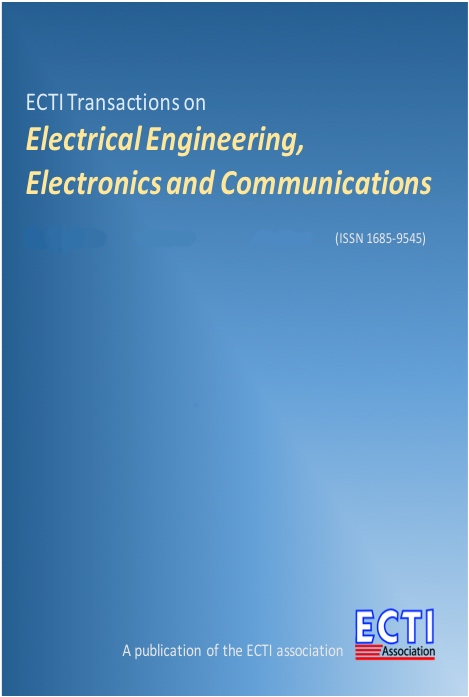Performance of Hybrid Binary and Non-Binary Turbo Decoding Schemes for LTE and DVB-RCS Standards
Main Article Content
Abstract
Binary and Non-Binary Turbo codes have been deployed in several digital communication standards to perform error correction. In order to enhance their error performance, several schemes such as Joint Source Channel Decoding (JSCD), extrinsic information scaling mechanisms, and prioritized QAM constellation mapping have been proposed for improving the error performance of error correcting codes. In this paper, hybrid schemes comprising of JSCD, regression based extrinsic information scaling, and prioritized 16-Quadrature Amplitude Modulation (QAM) with binary and non-binary Turbo codes have been presented. Significant improvement in error performance has been observed with the proposed scheme as compared to the conventional one. The hybrid scheme in the case of binary symmetric and asymmetric LTE Turbo codes, and triple binary Turbo codes outperform the conventional scheme by 0.8 dB on average. With duo-binary Turbo codes for the DVB-RCS standard, the hybrid scheme outperforms the conventional one with an average gain of 0.9 dB in BER performance.
Article Details

This work is licensed under a Creative Commons Attribution-NonCommercial-NoDerivatives 4.0 International License.
This journal provides immediate open access to its content on the principle that making research freely available to the public supports a greater global exchange of knowledge.
- Creative Commons Copyright License
The journal allows readers to download and share all published articles as long as they properly cite such articles; however, they cannot change them or use them commercially. This is classified as CC BY-NC-ND for the creative commons license.
- Retention of Copyright and Publishing Rights
The journal allows the authors of the published articles to hold copyrights and publishing rights without restrictions.
References
[2] A. Zribi, T. Matsumoto and R. Pyndiah, "Joint source-channel decoding for LDPC-coded error-corrupted binary Markov sources," in International Conference on Computing, Networking and Communications (ICNC), 2016.
[3] R. Mahmood, Q. Huang and W. Zulin, "A novel decoding method for Linear Index Joint Source-Channel Coding schemes," in 13th International Bhurban Conference on Applied Sciences and Technology (IBCAST), 2016.
[4] H. Balta and C. Douillard, "On the influence of the extrinsic information scaling coefficient on the performance of single and double binary turbo codes," AECE - Advances in Electrical and Computer Engineering Journal, vol. 2013, no. 2, pp. 77 - 84, 2013.
[5] T. P. Fowdur, Y. Beeharry and K. M. S. Soyjaudah, "A Novel scaling and Stopping Mechanism for LTE Turbo Codes based on Regression Analysis," Annals of Telecommunications, vol. 71, no. 7, pp. 369 - 388, 2016.
[6] H. Lüders, A. Minwegen and P. Vary, "Improving UMTS LTE Performance by UEP in High Order Modulation," in 7th International Workshop on Multi-Carrier Systems & Systems (MC-SS 2009), Herrsching, Germany, 2009.
[7] T. P. Fowdur, Y. Beeharry and K. M. S. Soyjaudah, "Performance of Turbo Coded 64-QAM with Joint Source Channel Decoding, Adaptive Scaling and Prioritised Constellation Mapping," in CTRQ, 6th International Conference on Communication Theory, Reliability, and Quality of Service, Venice, Italy, April, 2013.
[8] T. P. Fowdur, Y. Beeharry and K. M. S. Soyjaudah, "Performance of LTE Turbo Codes with Joint Source Channel Decoding, Adaptive Scaling and Prioritised QAM Constellation Mapping," International Journal on Advances in Telecommunications, vol. 6, no. 3 & 4, pp. 143 - 152, 2013.
[9] H. Mukhtar and M. El-Tarhuni, "An Adaptive Hierarchical QAM Scheme for Enhanced Bandwidth and Power Utilization," IEEE Transactions on Communications, vol. 60, no. 8, pp. 2275 - 2284, August, 2012.
[10] J. Lee, K. A. Kim, J. S. Jung and S. C. Lee, "Analytical Performance Evaluatioin of Hierarchical 16-QAM for Multicast/Broadcast Transmission," IEEE Communications Letters, vol. 16, no. 10, pp. 1536 - 1539, August, 2012.
[11] M. A. Kader, F. Ghani and R. Badlishah, "Development and Performance Evaluation of Hierarchical Quadrature Amplitude Modulation (HQAM) for Image transmission over Wireless Channels," in 3rd International Conference on Computation Intelligence, Modelling & Simulation, Langkawi, September, 2011.
[12] Y. Beeharry, T. P. Fowdur and K. M. S. Soyjaudah, "Performance Analysis of Symmetric and Assymetric LTE Turbo codes with Prioritisation and Regression based Scaling," in 1st International Conference on Electrical, Electronic and Communications Engineering (ELECOM), Bagatelle, Mauritius, 2016.
[13] Y. Takishima, M. Wada and H. Murakami, "Reversible Variable Length Codes," IEEE Trans. Commun., vol. 43, pp. 158-162, 1995.
[14] C. Douillard, C. Berou and M. Jezequel, "Multiple parallel concatenation (CRSC) codes," Annals of Telecommunications, vol. 64, no. 3-4, pp. 166-172, 1999.
[15] Y. Gao and M. R. Soleymani, "Triple binary circular recursive systematic convolutional turbo codes," IEEE, pp. 951-955, 2002.
[16] M. R. Soleymani and Y. Gao, "Spectrally efficient non-binary turbo codes: Beyond DVB-RCS standard," Proceedings of 21st Biennial Symposium on Communications, vol. 3, pp. 951-955, 2002.
[17] T. P. Fowdur and Y. Beni, "Reliable JPEG image transmission using unequal error protection with modified non-binary turbo codes," IARIA, vol. 5, no. 3-4, pp. 284-296, 2012.
[18] T. P. Fowdur and K. M. S. Soyjaudah, "Performance of Joint source-channel decoding with iterative bit combining and detection," Annals of telecommunications, vol. 63, no. 7 - 8, pp. 409 -423, August 2008.
[19] H. Balta, M. Kovaci, C. Botiz and C. Poenaru, "Bit Decoding versus Symbol Decoding in Multi-Binary Turbo Decoders," in 4th International Conference of Engineering Technologies, ICET 2009, Novi, Sad, 2009.
[20] Y. Beeharry, T. P. Fowdur and K. M. S. Sojaudah, "Symbol-Level Decoding Algorithms for Duo-Binary Turbo Codes," IIUM Journal, vol. Accepted for Publication, 2016.
[21] Y. O. C. Mouhamedou, 2005. [Online]. Available: https://www-mmsp.ece.mcgill.ca/MMSP/Theses/2005/Ould-Cheikh-MouhamedouT2005.pdf. [Accessed December 2012].
[22] M. Jeanne, J. Carlach and P. Siohan, "Joint Source-Channel decoding of variable-length codes for convolutional codes and turbo codes," IEEE Transactions on Communications, vol. 53, no. 1, pp. 10-15, 2005.
[23] M. Suryanegara, M. Khalimudin and N. Raharya, "The comparison between Asymmetric Turbo Code using O' QPP Interleaver and LTE Turbo Code," in International Conference on Quality in Research (QiR), Lombok, Indonesia, 2015.


